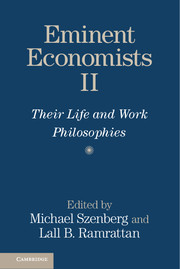Book contents
- Frontmatter
- Dedication
- Contents
- List of Contributors
- Foreword
- Preface and Acknowledgments
- Introduction
- 1 Being There: An Intellectual Journey
- 2 Social Norms in Economics and in the Economics Profession
- 3 Personal Reflections on My Professional Life
- 4 Gray Eminence?
- 5 Biochemist to Economist
- 6 Puzzles and Paradoxes: A Life in Applied Economics
- 7 Succeeding in Economics
- 8 My Research Strategy
- 9 My Philosophy of Economics, Life, and Everything (Not!)
- 10 Finding a Niche
- 11 Become an Economist – See the World
- 12 Practitioner of the Dismal Science? Who, Me? Couldn’t Be!!
- 13 One Job, Four Careers
- 14 My Life and Research Strategy
- 15 How I Ended Up Being a Multifaceted Economist and the Mentors I Have Had
- 16 Searching for My Personal Philosophy
- 17 Learning about the Evolving International Economy
- 18 Confessions of a Wellesley FEM
- 19 God, Ants, and Thomas Bayes
- 20 The Path of a Monetary Economist
- 21 Learning from the Field
- 22 Order in and through Disorder: The Invisible Hand as a Turbulent Regulator
- 23 The Education of an Economist
- 24 Faith, Science, and Religion
- 25 My Studies in International Economics
- 26 Sailing into the Wind
- 27 My Life and Work Philosophy
- 28 Scaling Fortress Economics
- 29 The Accidental Economist
- Index
- References
7 - Succeeding in Economics
Published online by Cambridge University Press: 05 June 2014
- Frontmatter
- Dedication
- Contents
- List of Contributors
- Foreword
- Preface and Acknowledgments
- Introduction
- 1 Being There: An Intellectual Journey
- 2 Social Norms in Economics and in the Economics Profession
- 3 Personal Reflections on My Professional Life
- 4 Gray Eminence?
- 5 Biochemist to Economist
- 6 Puzzles and Paradoxes: A Life in Applied Economics
- 7 Succeeding in Economics
- 8 My Research Strategy
- 9 My Philosophy of Economics, Life, and Everything (Not!)
- 10 Finding a Niche
- 11 Become an Economist – See the World
- 12 Practitioner of the Dismal Science? Who, Me? Couldn’t Be!!
- 13 One Job, Four Careers
- 14 My Life and Research Strategy
- 15 How I Ended Up Being a Multifaceted Economist and the Mentors I Have Had
- 16 Searching for My Personal Philosophy
- 17 Learning about the Evolving International Economy
- 18 Confessions of a Wellesley FEM
- 19 God, Ants, and Thomas Bayes
- 20 The Path of a Monetary Economist
- 21 Learning from the Field
- 22 Order in and through Disorder: The Invisible Hand as a Turbulent Regulator
- 23 The Education of an Economist
- 24 Faith, Science, and Religion
- 25 My Studies in International Economics
- 26 Sailing into the Wind
- 27 My Life and Work Philosophy
- 28 Scaling Fortress Economics
- 29 The Accidental Economist
- Index
- References
Summary
The editors of this volume invited me to discuss professional aspects of my life as an economist as part of a series of similar discussions by others. They thought readers might find this of interest and might even benefit from learning how contributors to this series go about their work. My intent here is simply to highlight some aspects of my career that have helped me progress in the profession. What has helped me may not be equally helpful to others, each of us being unique in experience, capability, and interest. Indeed, some conditions that have helped me along have not been of my own making. Each of us, for example, is born at a particular time in a particular place and to a particular set of parents. Although we can influence the views of our parents as we mature, we are powerless to affect time and place of birth. Yet these do influence what we will do and how well we will do it.
The first full year of the Great Depression, 1930, is the date of my birth and the city of Chicago is the place. The decade of the 1930s, of course, began a long period of hard times for a great many families, including mine. Although hard times make success more difficult in ways that are well known, the 1930 birth date made success in academia easier. One advantage of this date was that I became a member of an age cohort that was made smaller by the Depression. When I entered the academic marketplace in 1958, I faced fewer competitors than would have been the case if prior years had been more prosperous. Another advantage was that the GI bill, which offset what would have been the impact of prior Depression years, was still channeling a very large number of World War II and Korean War veterans into college as I sought my first professional teaching position. These consequences of my birth date put me in the academic marketplace when the entering supply of new PhDs was relatively small and the demand for their services was relatively large. Adjusting for quality of training, most graduating PhDs enjoyed an abundance of job offers that lasted for the better part of a decade.
- Type
- Chapter
- Information
- Eminent Economists IITheir Life and Work Philosophies, pp. 102 - 110Publisher: Cambridge University PressPrint publication year: 2014



